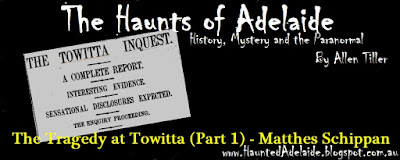The Tragedy at Towitta (Part 1) – Matthes Schippan
Towitta, a tiny township located on the Long Plain, about
5kms north-west of Sedan, is a remote village consisting of just a few houses.
The original settlement was put in place in 1877 due to an excellent water
resource in the area, used to sustain stock travelling through the region to
interstate destinations.
It is most probable you have never heard of this town, nor of what unfolded within in it in 1902, an event that would mark the area, the people and annuals of South Australian Law for all time.
It is most probable you have never heard of this town, nor of what unfolded within in it in 1902, an event that would mark the area, the people and annuals of South Australian Law for all time.
Matthes Schippan was born in 1853 in Germany. Legend has it
that after his mother died, his father became a raging alcoholic and his
brother was killed and eaten by a wolf.
His Father moved him
to Australia at three years of age. His future wife, Johanna Dohnt, was born in
Kotbus, Prussia on the 9th of April 1844, and had moved to Australia
with her 1854 to Victoria, to later move to the wine regions of South
Australia, where her father worked around Eden Valley, the Barossa Valley and
Flaxman's Valley.
 The Schippan family first came into the region when Matthes
Schippan acquired land on the 18th of August 1873 through a
Government lease. Matthes purchased the property at the end of the lease in
1888 and built the family home - a pug and pine construction.
The Schippan family first came into the region when Matthes
Schippan acquired land on the 18th of August 1873 through a
Government lease. Matthes purchased the property at the end of the lease in
1888 and built the family home - a pug and pine construction.
The couple had seven children; The oldest being Pauline
Auguste, born in 1875, followed by Maria Auguste, born in 1877 in Towitta
(known in the family as Mary), then followed Fritz Carl Martin in 1879,
Heinrich Johann Gustav in 1881, August Wilhelm in 1883, Wilhelm Johann Gottleib
in 1886 and the youngest, Johanne Elizabeth in 1888, who was known in the
family as “Bertha.”
Although many identified the Schippans as German, they were
actually of Wendish descent, a people with their own language and customs,
distinctly different to their neighboring German cousins. A large Wendish
community can be found in the Barossa Valley in the town of Ebenezer.
The Wendish were often
regarded by Germans as a strange group, due to being prone to superstition and
belief in witchcraft, which put them offside with God Fearing Lutherans.
Matthes was a man of
little emotion, except anger – he fired up to a rage very easily and was a
strict disciplinarian to his children. Everyone in Towitta knew Matthes, but
few called him friend, in fact most people avoided the bearded grizzly looking
man if they could.
In 1896, Matthes found
himself in a world of trouble. On his way to a neighbour’s home one Sunday
evening to collect two of his children and bring them home, Matthes came across
three young men, Karl Hartwig, his
brother Hermann and their friend William Radomi. The three men young, all
around 20 years of age began to taunt Matthes, who was walking the road to his
neighbours, carrying only his rifle.
The three young men tried to get Matthes to fire his rifle in their direction, one of them started throwing stones at the older man, goading him into firing the rifle. Matthew warned them to stop.
The three young men tried to get Matthes to fire his rifle in their direction, one of them started throwing stones at the older man, goading him into firing the rifle. Matthew warned them to stop.
They continued their
taunts until finally, Matthes fired his gun into the ground.
The three young men rushed at Matthes and pushed him, then began to sprint away, Matthes anger drew up, he fired his gun into the ground again, but this time the bullet ricocheted and hit Karl Hartwig in the calf, wounding him.
The three young men rushed at Matthes and pushed him, then began to sprint away, Matthes anger drew up, he fired his gun into the ground again, but this time the bullet ricocheted and hit Karl Hartwig in the calf, wounding him.
Matthes Schippan was
arrested for his crime and later released on bail. He appeared in the Adelaide
Supreme Court, but the case was soon dropped when the prosecutor dropped the
charges. However, Justice Boucat did caution Matthes about firing his rifle
in the manner he had and warned him the young man might have been killed if
circumstances were different, and this could have seen him hung in Adelaide Gaol.
After this event,
Matthes was avoided even more so than usual in and around Towitta, and he
became much more withdrawn from society and his family, finding it hard to
trust anyone.
Next Week: The Tragedy
at Towitta (Part 2) – Johanne Schippan and Her Family


